Analysis of Entrepreneurship: Concepts, Theories, and Enterprise Types
VerifiedAdded on 2023/06/17
|10
|3328
|461
Essay
AI Summary
This essay provides a detailed analysis of entrepreneurship in business, covering key concepts, theories, and different types of enterprises. It explores the core concepts of entrepreneurship, including risk-bearing, innovation, managerial skills, creativity, and leadership. Prominent theories such as Schumpeter's Innovation Theory and Weber's Social Change Theory are examined, alongside leadership theories relevant to entrepreneurial success. The essay also analyzes various enterprise types, including sole proprietorships, partnership firms, private limited companies, and public limited companies, highlighting their characteristics, advantages, and disadvantages. Furthermore, it emphasizes the importance of entrepreneurship to organizations, individuals, and the economy at large, focusing on improved living standards, profitability, and economic growth.

Entrepreneurship in Business
Paraphrase This Document
Need a fresh take? Get an instant paraphrase of this document with our AI Paraphraser
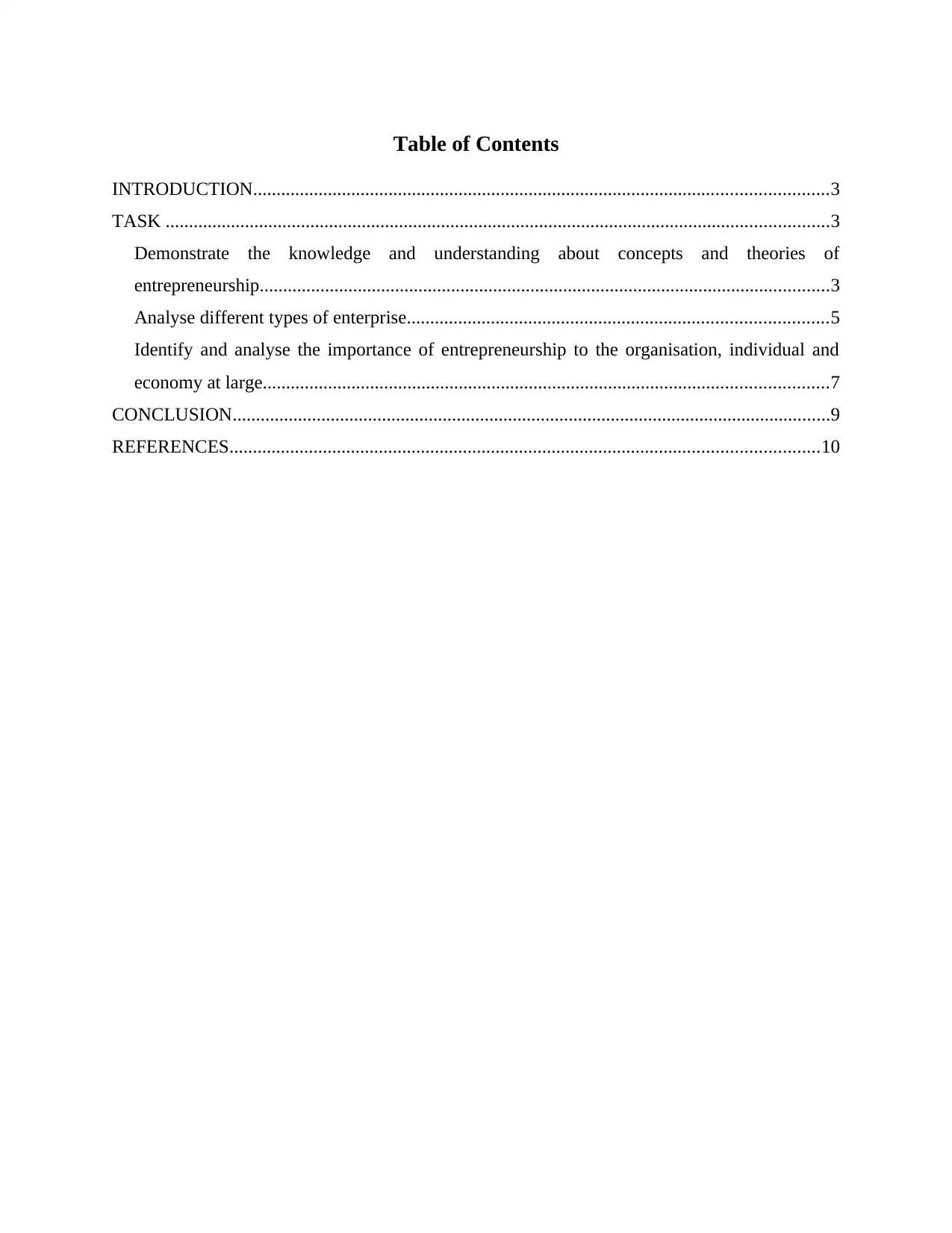
Table of Contents
INTRODUCTION...........................................................................................................................3
TASK ..............................................................................................................................................3
Demonstrate the knowledge and understanding about concepts and theories of
entrepreneurship..........................................................................................................................3
Analyse different types of enterprise..........................................................................................5
Identify and analyse the importance of entrepreneurship to the organisation, individual and
economy at large.........................................................................................................................7
CONCLUSION................................................................................................................................9
REFERENCES..............................................................................................................................10
INTRODUCTION...........................................................................................................................3
TASK ..............................................................................................................................................3
Demonstrate the knowledge and understanding about concepts and theories of
entrepreneurship..........................................................................................................................3
Analyse different types of enterprise..........................................................................................5
Identify and analyse the importance of entrepreneurship to the organisation, individual and
economy at large.........................................................................................................................7
CONCLUSION................................................................................................................................9
REFERENCES..............................................................................................................................10
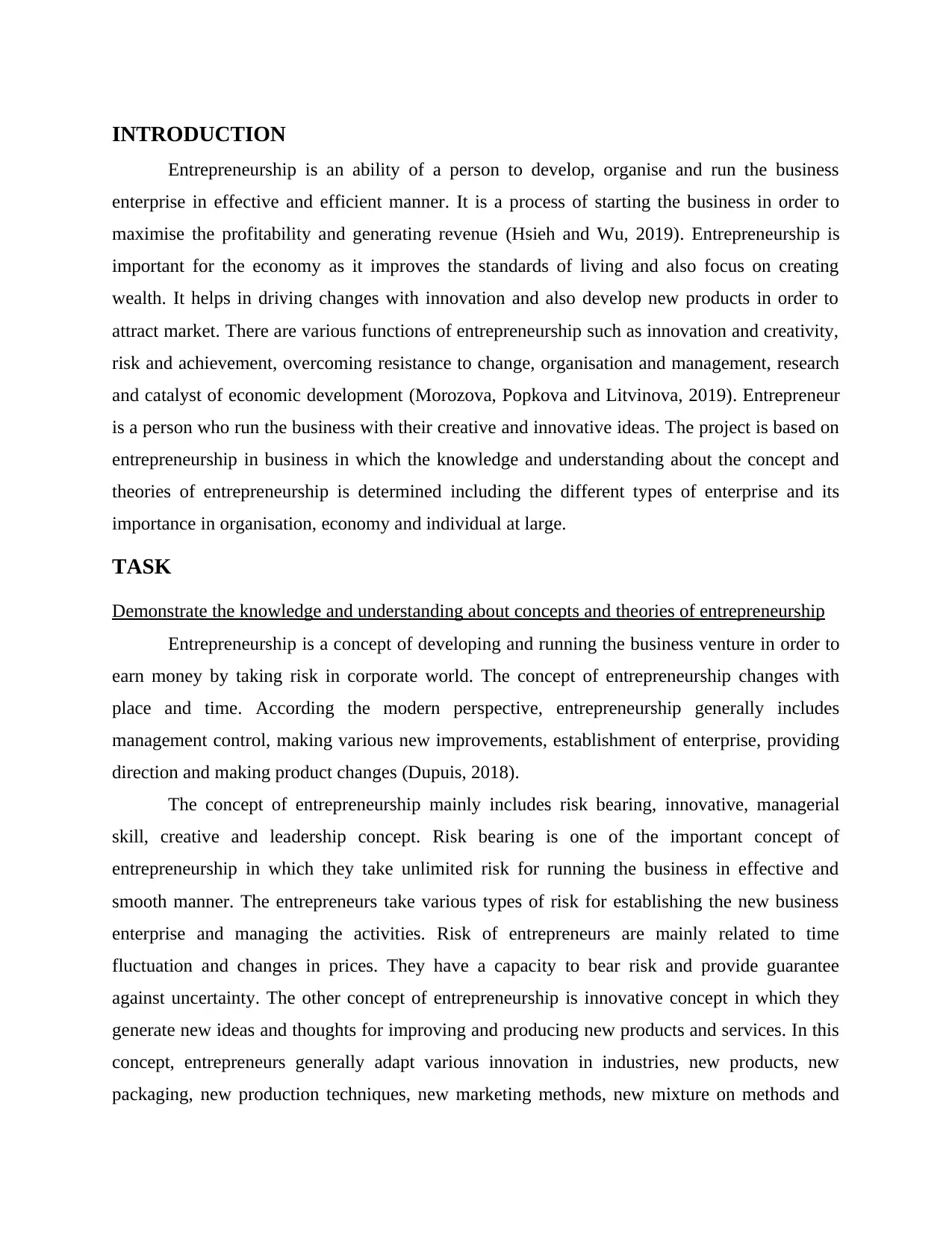
INTRODUCTION
Entrepreneurship is an ability of a person to develop, organise and run the business
enterprise in effective and efficient manner. It is a process of starting the business in order to
maximise the profitability and generating revenue (Hsieh and Wu, 2019). Entrepreneurship is
important for the economy as it improves the standards of living and also focus on creating
wealth. It helps in driving changes with innovation and also develop new products in order to
attract market. There are various functions of entrepreneurship such as innovation and creativity,
risk and achievement, overcoming resistance to change, organisation and management, research
and catalyst of economic development (Morozova, Popkova and Litvinova, 2019). Entrepreneur
is a person who run the business with their creative and innovative ideas. The project is based on
entrepreneurship in business in which the knowledge and understanding about the concept and
theories of entrepreneurship is determined including the different types of enterprise and its
importance in organisation, economy and individual at large.
TASK
Demonstrate the knowledge and understanding about concepts and theories of entrepreneurship
Entrepreneurship is a concept of developing and running the business venture in order to
earn money by taking risk in corporate world. The concept of entrepreneurship changes with
place and time. According the modern perspective, entrepreneurship generally includes
management control, making various new improvements, establishment of enterprise, providing
direction and making product changes (Dupuis, 2018).
The concept of entrepreneurship mainly includes risk bearing, innovative, managerial
skill, creative and leadership concept. Risk bearing is one of the important concept of
entrepreneurship in which they take unlimited risk for running the business in effective and
smooth manner. The entrepreneurs take various types of risk for establishing the new business
enterprise and managing the activities. Risk of entrepreneurs are mainly related to time
fluctuation and changes in prices. They have a capacity to bear risk and provide guarantee
against uncertainty. The other concept of entrepreneurship is innovative concept in which they
generate new ideas and thoughts for improving and producing new products and services. In this
concept, entrepreneurs generally adapt various innovation in industries, new products, new
packaging, new production techniques, new marketing methods, new mixture on methods and
Entrepreneurship is an ability of a person to develop, organise and run the business
enterprise in effective and efficient manner. It is a process of starting the business in order to
maximise the profitability and generating revenue (Hsieh and Wu, 2019). Entrepreneurship is
important for the economy as it improves the standards of living and also focus on creating
wealth. It helps in driving changes with innovation and also develop new products in order to
attract market. There are various functions of entrepreneurship such as innovation and creativity,
risk and achievement, overcoming resistance to change, organisation and management, research
and catalyst of economic development (Morozova, Popkova and Litvinova, 2019). Entrepreneur
is a person who run the business with their creative and innovative ideas. The project is based on
entrepreneurship in business in which the knowledge and understanding about the concept and
theories of entrepreneurship is determined including the different types of enterprise and its
importance in organisation, economy and individual at large.
TASK
Demonstrate the knowledge and understanding about concepts and theories of entrepreneurship
Entrepreneurship is a concept of developing and running the business venture in order to
earn money by taking risk in corporate world. The concept of entrepreneurship changes with
place and time. According the modern perspective, entrepreneurship generally includes
management control, making various new improvements, establishment of enterprise, providing
direction and making product changes (Dupuis, 2018).
The concept of entrepreneurship mainly includes risk bearing, innovative, managerial
skill, creative and leadership concept. Risk bearing is one of the important concept of
entrepreneurship in which they take unlimited risk for running the business in effective and
smooth manner. The entrepreneurs take various types of risk for establishing the new business
enterprise and managing the activities. Risk of entrepreneurs are mainly related to time
fluctuation and changes in prices. They have a capacity to bear risk and provide guarantee
against uncertainty. The other concept of entrepreneurship is innovative concept in which they
generate new ideas and thoughts for improving and producing new products and services. In this
concept, entrepreneurs generally adapt various innovation in industries, new products, new
packaging, new production techniques, new marketing methods, new mixture on methods and
⊘ This is a preview!⊘
Do you want full access?
Subscribe today to unlock all pages.

Trusted by 1+ million students worldwide
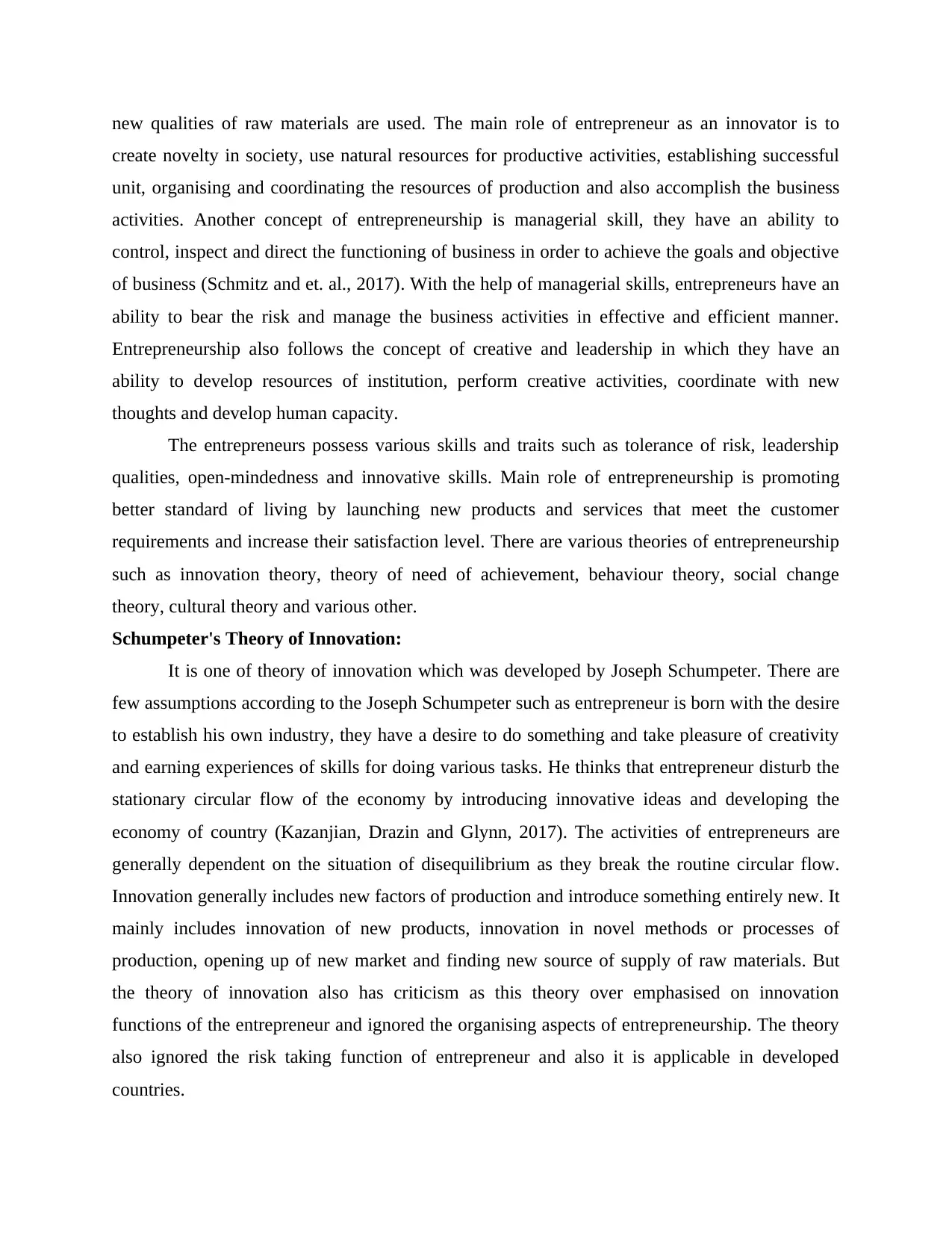
new qualities of raw materials are used. The main role of entrepreneur as an innovator is to
create novelty in society, use natural resources for productive activities, establishing successful
unit, organising and coordinating the resources of production and also accomplish the business
activities. Another concept of entrepreneurship is managerial skill, they have an ability to
control, inspect and direct the functioning of business in order to achieve the goals and objective
of business (Schmitz and et. al., 2017). With the help of managerial skills, entrepreneurs have an
ability to bear the risk and manage the business activities in effective and efficient manner.
Entrepreneurship also follows the concept of creative and leadership in which they have an
ability to develop resources of institution, perform creative activities, coordinate with new
thoughts and develop human capacity.
The entrepreneurs possess various skills and traits such as tolerance of risk, leadership
qualities, open-mindedness and innovative skills. Main role of entrepreneurship is promoting
better standard of living by launching new products and services that meet the customer
requirements and increase their satisfaction level. There are various theories of entrepreneurship
such as innovation theory, theory of need of achievement, behaviour theory, social change
theory, cultural theory and various other.
Schumpeter's Theory of Innovation:
It is one of theory of innovation which was developed by Joseph Schumpeter. There are
few assumptions according to the Joseph Schumpeter such as entrepreneur is born with the desire
to establish his own industry, they have a desire to do something and take pleasure of creativity
and earning experiences of skills for doing various tasks. He thinks that entrepreneur disturb the
stationary circular flow of the economy by introducing innovative ideas and developing the
economy of country (Kazanjian, Drazin and Glynn, 2017). The activities of entrepreneurs are
generally dependent on the situation of disequilibrium as they break the routine circular flow.
Innovation generally includes new factors of production and introduce something entirely new. It
mainly includes innovation of new products, innovation in novel methods or processes of
production, opening up of new market and finding new source of supply of raw materials. But
the theory of innovation also has criticism as this theory over emphasised on innovation
functions of the entrepreneur and ignored the organising aspects of entrepreneurship. The theory
also ignored the risk taking function of entrepreneur and also it is applicable in developed
countries.
create novelty in society, use natural resources for productive activities, establishing successful
unit, organising and coordinating the resources of production and also accomplish the business
activities. Another concept of entrepreneurship is managerial skill, they have an ability to
control, inspect and direct the functioning of business in order to achieve the goals and objective
of business (Schmitz and et. al., 2017). With the help of managerial skills, entrepreneurs have an
ability to bear the risk and manage the business activities in effective and efficient manner.
Entrepreneurship also follows the concept of creative and leadership in which they have an
ability to develop resources of institution, perform creative activities, coordinate with new
thoughts and develop human capacity.
The entrepreneurs possess various skills and traits such as tolerance of risk, leadership
qualities, open-mindedness and innovative skills. Main role of entrepreneurship is promoting
better standard of living by launching new products and services that meet the customer
requirements and increase their satisfaction level. There are various theories of entrepreneurship
such as innovation theory, theory of need of achievement, behaviour theory, social change
theory, cultural theory and various other.
Schumpeter's Theory of Innovation:
It is one of theory of innovation which was developed by Joseph Schumpeter. There are
few assumptions according to the Joseph Schumpeter such as entrepreneur is born with the desire
to establish his own industry, they have a desire to do something and take pleasure of creativity
and earning experiences of skills for doing various tasks. He thinks that entrepreneur disturb the
stationary circular flow of the economy by introducing innovative ideas and developing the
economy of country (Kazanjian, Drazin and Glynn, 2017). The activities of entrepreneurs are
generally dependent on the situation of disequilibrium as they break the routine circular flow.
Innovation generally includes new factors of production and introduce something entirely new. It
mainly includes innovation of new products, innovation in novel methods or processes of
production, opening up of new market and finding new source of supply of raw materials. But
the theory of innovation also has criticism as this theory over emphasised on innovation
functions of the entrepreneur and ignored the organising aspects of entrepreneurship. The theory
also ignored the risk taking function of entrepreneur and also it is applicable in developed
countries.
Paraphrase This Document
Need a fresh take? Get an instant paraphrase of this document with our AI Paraphraser
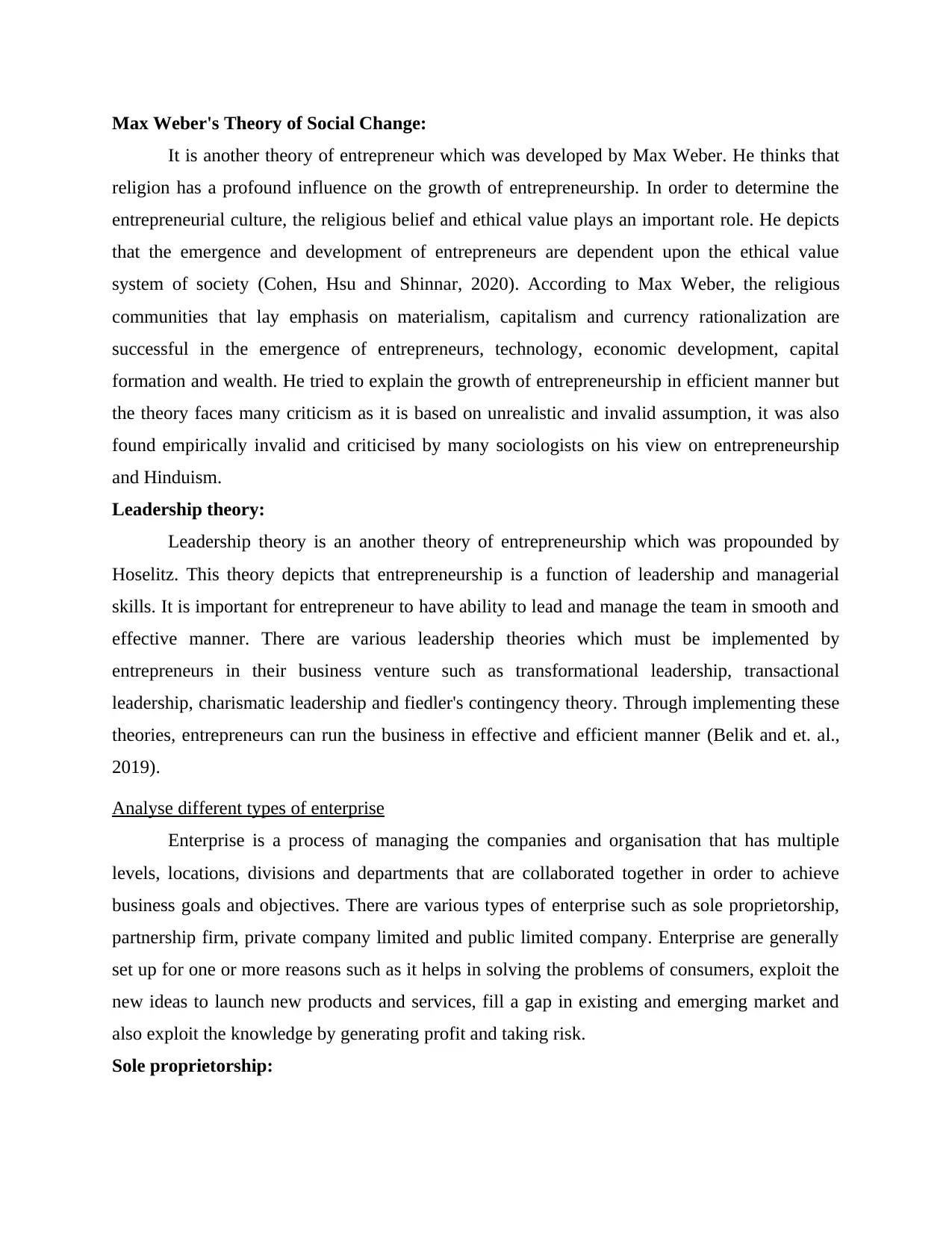
Max Weber's Theory of Social Change:
It is another theory of entrepreneur which was developed by Max Weber. He thinks that
religion has a profound influence on the growth of entrepreneurship. In order to determine the
entrepreneurial culture, the religious belief and ethical value plays an important role. He depicts
that the emergence and development of entrepreneurs are dependent upon the ethical value
system of society (Cohen, Hsu and Shinnar, 2020). According to Max Weber, the religious
communities that lay emphasis on materialism, capitalism and currency rationalization are
successful in the emergence of entrepreneurs, technology, economic development, capital
formation and wealth. He tried to explain the growth of entrepreneurship in efficient manner but
the theory faces many criticism as it is based on unrealistic and invalid assumption, it was also
found empirically invalid and criticised by many sociologists on his view on entrepreneurship
and Hinduism.
Leadership theory:
Leadership theory is an another theory of entrepreneurship which was propounded by
Hoselitz. This theory depicts that entrepreneurship is a function of leadership and managerial
skills. It is important for entrepreneur to have ability to lead and manage the team in smooth and
effective manner. There are various leadership theories which must be implemented by
entrepreneurs in their business venture such as transformational leadership, transactional
leadership, charismatic leadership and fiedler's contingency theory. Through implementing these
theories, entrepreneurs can run the business in effective and efficient manner (Belik and et. al.,
2019).
Analyse different types of enterprise
Enterprise is a process of managing the companies and organisation that has multiple
levels, locations, divisions and departments that are collaborated together in order to achieve
business goals and objectives. There are various types of enterprise such as sole proprietorship,
partnership firm, private company limited and public limited company. Enterprise are generally
set up for one or more reasons such as it helps in solving the problems of consumers, exploit the
new ideas to launch new products and services, fill a gap in existing and emerging market and
also exploit the knowledge by generating profit and taking risk.
Sole proprietorship:
It is another theory of entrepreneur which was developed by Max Weber. He thinks that
religion has a profound influence on the growth of entrepreneurship. In order to determine the
entrepreneurial culture, the religious belief and ethical value plays an important role. He depicts
that the emergence and development of entrepreneurs are dependent upon the ethical value
system of society (Cohen, Hsu and Shinnar, 2020). According to Max Weber, the religious
communities that lay emphasis on materialism, capitalism and currency rationalization are
successful in the emergence of entrepreneurs, technology, economic development, capital
formation and wealth. He tried to explain the growth of entrepreneurship in efficient manner but
the theory faces many criticism as it is based on unrealistic and invalid assumption, it was also
found empirically invalid and criticised by many sociologists on his view on entrepreneurship
and Hinduism.
Leadership theory:
Leadership theory is an another theory of entrepreneurship which was propounded by
Hoselitz. This theory depicts that entrepreneurship is a function of leadership and managerial
skills. It is important for entrepreneur to have ability to lead and manage the team in smooth and
effective manner. There are various leadership theories which must be implemented by
entrepreneurs in their business venture such as transformational leadership, transactional
leadership, charismatic leadership and fiedler's contingency theory. Through implementing these
theories, entrepreneurs can run the business in effective and efficient manner (Belik and et. al.,
2019).
Analyse different types of enterprise
Enterprise is a process of managing the companies and organisation that has multiple
levels, locations, divisions and departments that are collaborated together in order to achieve
business goals and objectives. There are various types of enterprise such as sole proprietorship,
partnership firm, private company limited and public limited company. Enterprise are generally
set up for one or more reasons such as it helps in solving the problems of consumers, exploit the
new ideas to launch new products and services, fill a gap in existing and emerging market and
also exploit the knowledge by generating profit and taking risk.
Sole proprietorship:
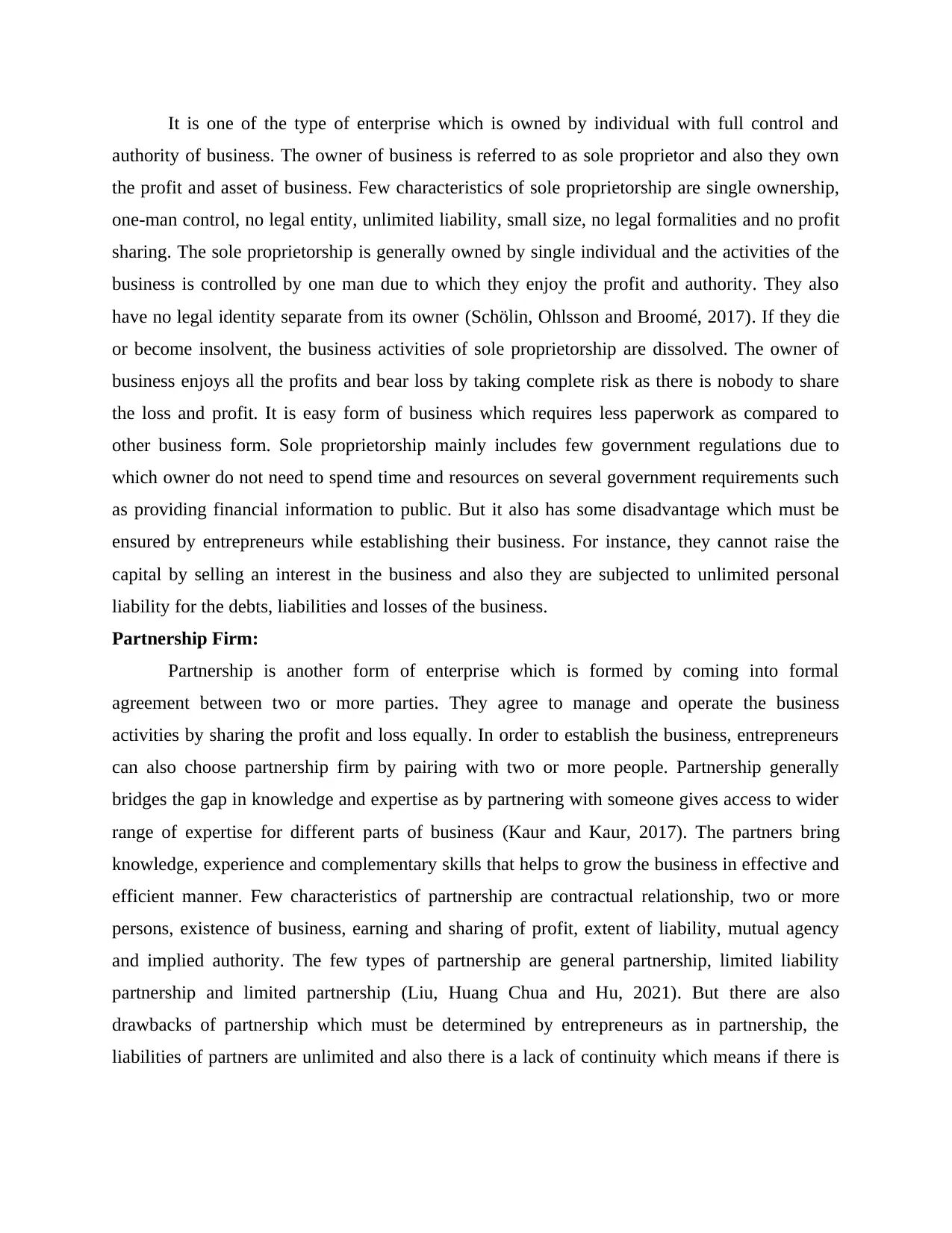
It is one of the type of enterprise which is owned by individual with full control and
authority of business. The owner of business is referred to as sole proprietor and also they own
the profit and asset of business. Few characteristics of sole proprietorship are single ownership,
one-man control, no legal entity, unlimited liability, small size, no legal formalities and no profit
sharing. The sole proprietorship is generally owned by single individual and the activities of the
business is controlled by one man due to which they enjoy the profit and authority. They also
have no legal identity separate from its owner (Schölin, Ohlsson and Broomé, 2017). If they die
or become insolvent, the business activities of sole proprietorship are dissolved. The owner of
business enjoys all the profits and bear loss by taking complete risk as there is nobody to share
the loss and profit. It is easy form of business which requires less paperwork as compared to
other business form. Sole proprietorship mainly includes few government regulations due to
which owner do not need to spend time and resources on several government requirements such
as providing financial information to public. But it also has some disadvantage which must be
ensured by entrepreneurs while establishing their business. For instance, they cannot raise the
capital by selling an interest in the business and also they are subjected to unlimited personal
liability for the debts, liabilities and losses of the business.
Partnership Firm:
Partnership is another form of enterprise which is formed by coming into formal
agreement between two or more parties. They agree to manage and operate the business
activities by sharing the profit and loss equally. In order to establish the business, entrepreneurs
can also choose partnership firm by pairing with two or more people. Partnership generally
bridges the gap in knowledge and expertise as by partnering with someone gives access to wider
range of expertise for different parts of business (Kaur and Kaur, 2017). The partners bring
knowledge, experience and complementary skills that helps to grow the business in effective and
efficient manner. Few characteristics of partnership are contractual relationship, two or more
persons, existence of business, earning and sharing of profit, extent of liability, mutual agency
and implied authority. The few types of partnership are general partnership, limited liability
partnership and limited partnership (Liu, Huang Chua and Hu, 2021). But there are also
drawbacks of partnership which must be determined by entrepreneurs as in partnership, the
liabilities of partners are unlimited and also there is a lack of continuity which means if there is
authority of business. The owner of business is referred to as sole proprietor and also they own
the profit and asset of business. Few characteristics of sole proprietorship are single ownership,
one-man control, no legal entity, unlimited liability, small size, no legal formalities and no profit
sharing. The sole proprietorship is generally owned by single individual and the activities of the
business is controlled by one man due to which they enjoy the profit and authority. They also
have no legal identity separate from its owner (Schölin, Ohlsson and Broomé, 2017). If they die
or become insolvent, the business activities of sole proprietorship are dissolved. The owner of
business enjoys all the profits and bear loss by taking complete risk as there is nobody to share
the loss and profit. It is easy form of business which requires less paperwork as compared to
other business form. Sole proprietorship mainly includes few government regulations due to
which owner do not need to spend time and resources on several government requirements such
as providing financial information to public. But it also has some disadvantage which must be
ensured by entrepreneurs while establishing their business. For instance, they cannot raise the
capital by selling an interest in the business and also they are subjected to unlimited personal
liability for the debts, liabilities and losses of the business.
Partnership Firm:
Partnership is another form of enterprise which is formed by coming into formal
agreement between two or more parties. They agree to manage and operate the business
activities by sharing the profit and loss equally. In order to establish the business, entrepreneurs
can also choose partnership firm by pairing with two or more people. Partnership generally
bridges the gap in knowledge and expertise as by partnering with someone gives access to wider
range of expertise for different parts of business (Kaur and Kaur, 2017). The partners bring
knowledge, experience and complementary skills that helps to grow the business in effective and
efficient manner. Few characteristics of partnership are contractual relationship, two or more
persons, existence of business, earning and sharing of profit, extent of liability, mutual agency
and implied authority. The few types of partnership are general partnership, limited liability
partnership and limited partnership (Liu, Huang Chua and Hu, 2021). But there are also
drawbacks of partnership which must be determined by entrepreneurs as in partnership, the
liabilities of partners are unlimited and also there is a lack of continuity which means if there is
⊘ This is a preview!⊘
Do you want full access?
Subscribe today to unlock all pages.

Trusted by 1+ million students worldwide
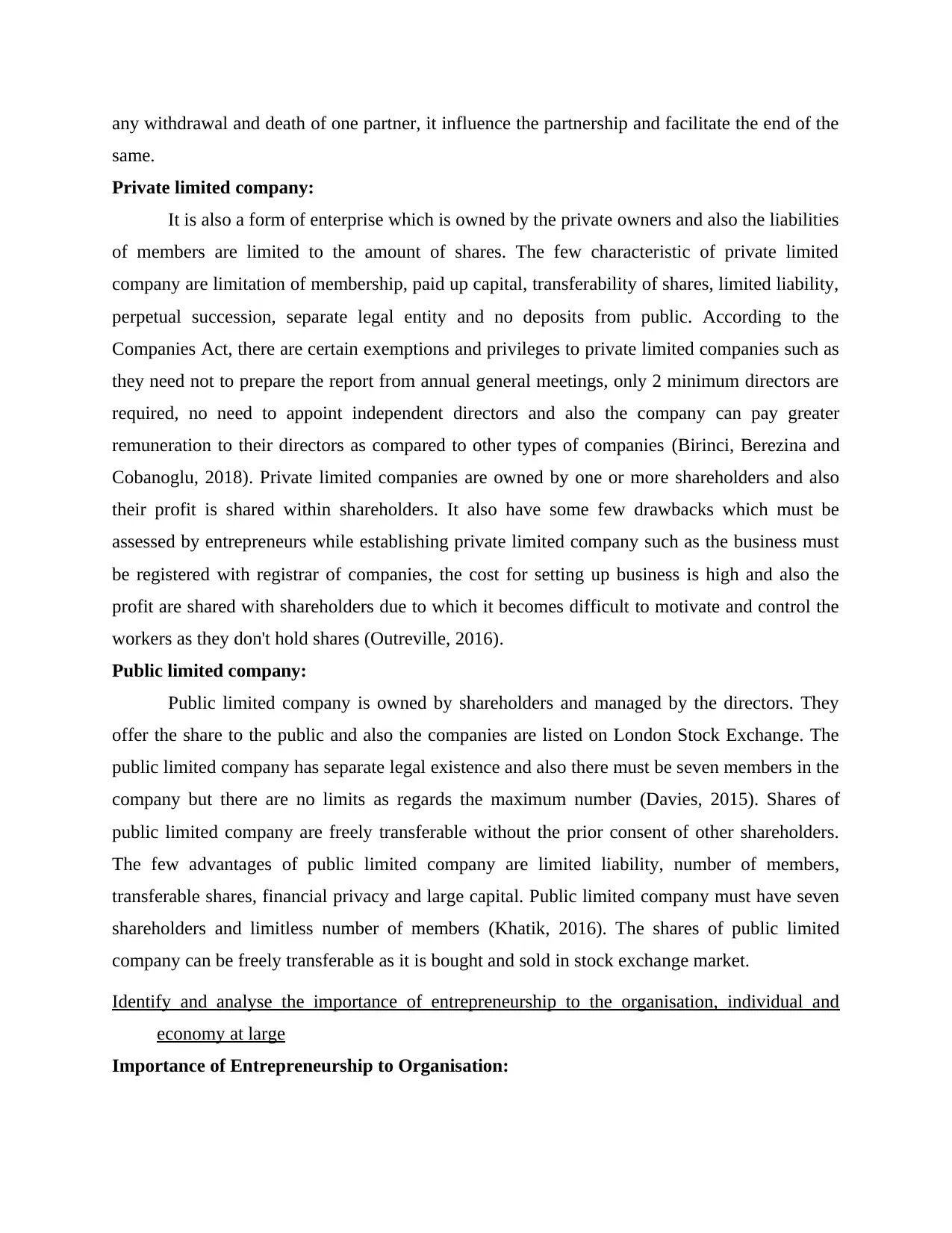
any withdrawal and death of one partner, it influence the partnership and facilitate the end of the
same.
Private limited company:
It is also a form of enterprise which is owned by the private owners and also the liabilities
of members are limited to the amount of shares. The few characteristic of private limited
company are limitation of membership, paid up capital, transferability of shares, limited liability,
perpetual succession, separate legal entity and no deposits from public. According to the
Companies Act, there are certain exemptions and privileges to private limited companies such as
they need not to prepare the report from annual general meetings, only 2 minimum directors are
required, no need to appoint independent directors and also the company can pay greater
remuneration to their directors as compared to other types of companies (Birinci, Berezina and
Cobanoglu, 2018). Private limited companies are owned by one or more shareholders and also
their profit is shared within shareholders. It also have some few drawbacks which must be
assessed by entrepreneurs while establishing private limited company such as the business must
be registered with registrar of companies, the cost for setting up business is high and also the
profit are shared with shareholders due to which it becomes difficult to motivate and control the
workers as they don't hold shares (Outreville, 2016).
Public limited company:
Public limited company is owned by shareholders and managed by the directors. They
offer the share to the public and also the companies are listed on London Stock Exchange. The
public limited company has separate legal existence and also there must be seven members in the
company but there are no limits as regards the maximum number (Davies, 2015). Shares of
public limited company are freely transferable without the prior consent of other shareholders.
The few advantages of public limited company are limited liability, number of members,
transferable shares, financial privacy and large capital. Public limited company must have seven
shareholders and limitless number of members (Khatik, 2016). The shares of public limited
company can be freely transferable as it is bought and sold in stock exchange market.
Identify and analyse the importance of entrepreneurship to the organisation, individual and
economy at large
Importance of Entrepreneurship to Organisation:
same.
Private limited company:
It is also a form of enterprise which is owned by the private owners and also the liabilities
of members are limited to the amount of shares. The few characteristic of private limited
company are limitation of membership, paid up capital, transferability of shares, limited liability,
perpetual succession, separate legal entity and no deposits from public. According to the
Companies Act, there are certain exemptions and privileges to private limited companies such as
they need not to prepare the report from annual general meetings, only 2 minimum directors are
required, no need to appoint independent directors and also the company can pay greater
remuneration to their directors as compared to other types of companies (Birinci, Berezina and
Cobanoglu, 2018). Private limited companies are owned by one or more shareholders and also
their profit is shared within shareholders. It also have some few drawbacks which must be
assessed by entrepreneurs while establishing private limited company such as the business must
be registered with registrar of companies, the cost for setting up business is high and also the
profit are shared with shareholders due to which it becomes difficult to motivate and control the
workers as they don't hold shares (Outreville, 2016).
Public limited company:
Public limited company is owned by shareholders and managed by the directors. They
offer the share to the public and also the companies are listed on London Stock Exchange. The
public limited company has separate legal existence and also there must be seven members in the
company but there are no limits as regards the maximum number (Davies, 2015). Shares of
public limited company are freely transferable without the prior consent of other shareholders.
The few advantages of public limited company are limited liability, number of members,
transferable shares, financial privacy and large capital. Public limited company must have seven
shareholders and limitless number of members (Khatik, 2016). The shares of public limited
company can be freely transferable as it is bought and sold in stock exchange market.
Identify and analyse the importance of entrepreneurship to the organisation, individual and
economy at large
Importance of Entrepreneurship to Organisation:
Paraphrase This Document
Need a fresh take? Get an instant paraphrase of this document with our AI Paraphraser
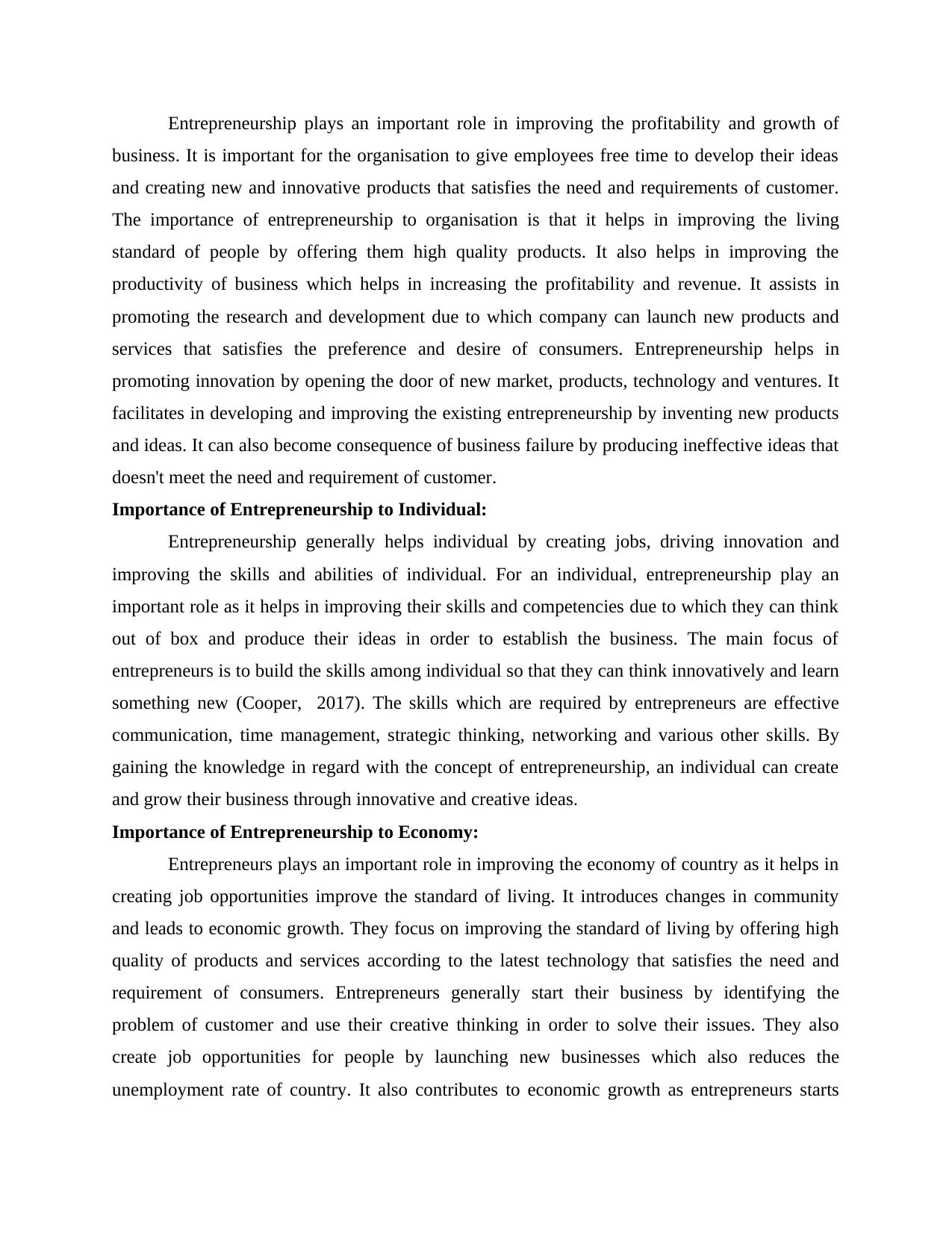
Entrepreneurship plays an important role in improving the profitability and growth of
business. It is important for the organisation to give employees free time to develop their ideas
and creating new and innovative products that satisfies the need and requirements of customer.
The importance of entrepreneurship to organisation is that it helps in improving the living
standard of people by offering them high quality products. It also helps in improving the
productivity of business which helps in increasing the profitability and revenue. It assists in
promoting the research and development due to which company can launch new products and
services that satisfies the preference and desire of consumers. Entrepreneurship helps in
promoting innovation by opening the door of new market, products, technology and ventures. It
facilitates in developing and improving the existing entrepreneurship by inventing new products
and ideas. It can also become consequence of business failure by producing ineffective ideas that
doesn't meet the need and requirement of customer.
Importance of Entrepreneurship to Individual:
Entrepreneurship generally helps individual by creating jobs, driving innovation and
improving the skills and abilities of individual. For an individual, entrepreneurship play an
important role as it helps in improving their skills and competencies due to which they can think
out of box and produce their ideas in order to establish the business. The main focus of
entrepreneurs is to build the skills among individual so that they can think innovatively and learn
something new (Cooper, 2017). The skills which are required by entrepreneurs are effective
communication, time management, strategic thinking, networking and various other skills. By
gaining the knowledge in regard with the concept of entrepreneurship, an individual can create
and grow their business through innovative and creative ideas.
Importance of Entrepreneurship to Economy:
Entrepreneurs plays an important role in improving the economy of country as it helps in
creating job opportunities improve the standard of living. It introduces changes in community
and leads to economic growth. They focus on improving the standard of living by offering high
quality of products and services according to the latest technology that satisfies the need and
requirement of consumers. Entrepreneurs generally start their business by identifying the
problem of customer and use their creative thinking in order to solve their issues. They also
create job opportunities for people by launching new businesses which also reduces the
unemployment rate of country. It also contributes to economic growth as entrepreneurs starts
business. It is important for the organisation to give employees free time to develop their ideas
and creating new and innovative products that satisfies the need and requirements of customer.
The importance of entrepreneurship to organisation is that it helps in improving the living
standard of people by offering them high quality products. It also helps in improving the
productivity of business which helps in increasing the profitability and revenue. It assists in
promoting the research and development due to which company can launch new products and
services that satisfies the preference and desire of consumers. Entrepreneurship helps in
promoting innovation by opening the door of new market, products, technology and ventures. It
facilitates in developing and improving the existing entrepreneurship by inventing new products
and ideas. It can also become consequence of business failure by producing ineffective ideas that
doesn't meet the need and requirement of customer.
Importance of Entrepreneurship to Individual:
Entrepreneurship generally helps individual by creating jobs, driving innovation and
improving the skills and abilities of individual. For an individual, entrepreneurship play an
important role as it helps in improving their skills and competencies due to which they can think
out of box and produce their ideas in order to establish the business. The main focus of
entrepreneurs is to build the skills among individual so that they can think innovatively and learn
something new (Cooper, 2017). The skills which are required by entrepreneurs are effective
communication, time management, strategic thinking, networking and various other skills. By
gaining the knowledge in regard with the concept of entrepreneurship, an individual can create
and grow their business through innovative and creative ideas.
Importance of Entrepreneurship to Economy:
Entrepreneurs plays an important role in improving the economy of country as it helps in
creating job opportunities improve the standard of living. It introduces changes in community
and leads to economic growth. They focus on improving the standard of living by offering high
quality of products and services according to the latest technology that satisfies the need and
requirement of consumers. Entrepreneurs generally start their business by identifying the
problem of customer and use their creative thinking in order to solve their issues. They also
create job opportunities for people by launching new businesses which also reduces the
unemployment rate of country. It also contributes to economic growth as entrepreneurs starts
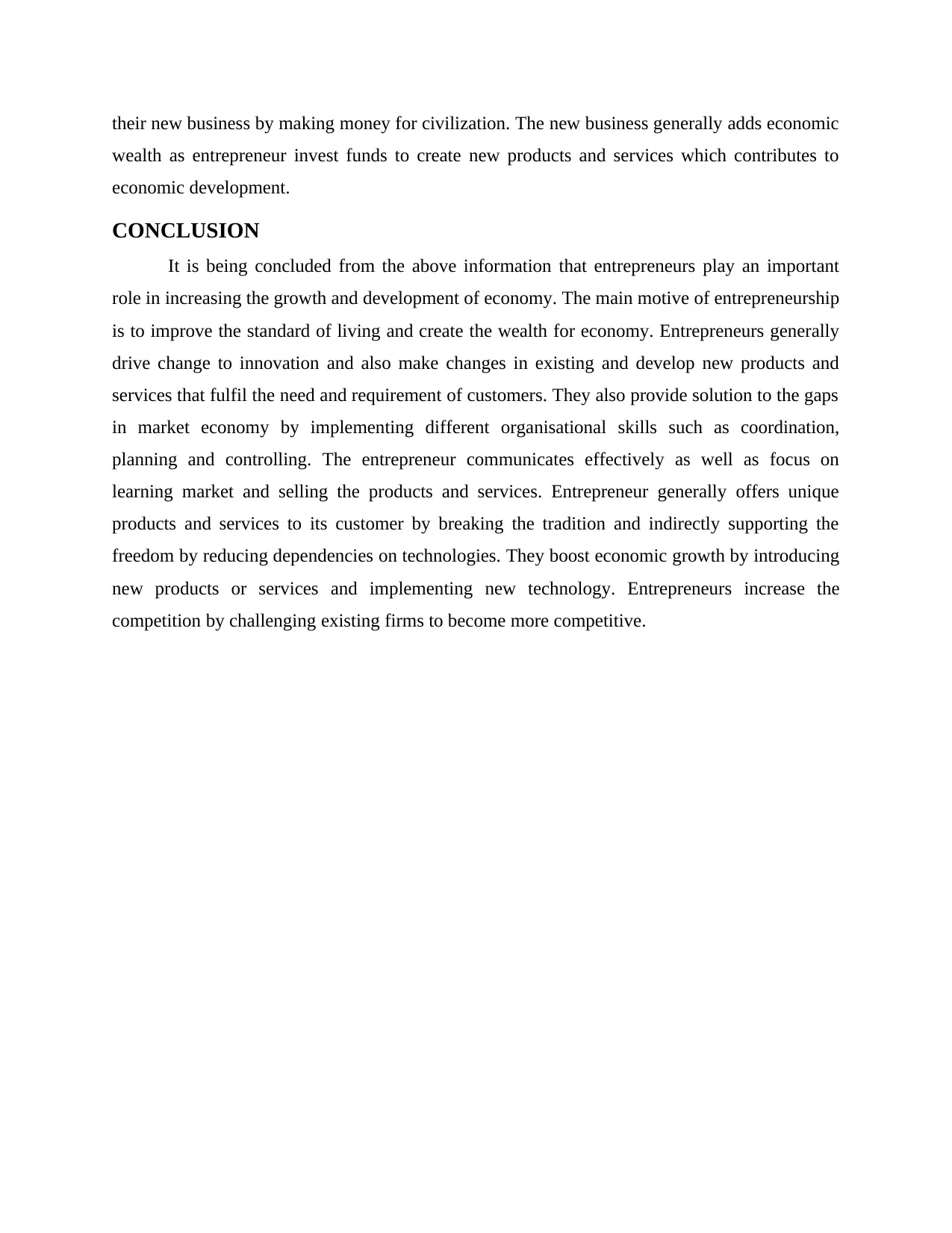
their new business by making money for civilization. The new business generally adds economic
wealth as entrepreneur invest funds to create new products and services which contributes to
economic development.
CONCLUSION
It is being concluded from the above information that entrepreneurs play an important
role in increasing the growth and development of economy. The main motive of entrepreneurship
is to improve the standard of living and create the wealth for economy. Entrepreneurs generally
drive change to innovation and also make changes in existing and develop new products and
services that fulfil the need and requirement of customers. They also provide solution to the gaps
in market economy by implementing different organisational skills such as coordination,
planning and controlling. The entrepreneur communicates effectively as well as focus on
learning market and selling the products and services. Entrepreneur generally offers unique
products and services to its customer by breaking the tradition and indirectly supporting the
freedom by reducing dependencies on technologies. They boost economic growth by introducing
new products or services and implementing new technology. Entrepreneurs increase the
competition by challenging existing firms to become more competitive.
wealth as entrepreneur invest funds to create new products and services which contributes to
economic development.
CONCLUSION
It is being concluded from the above information that entrepreneurs play an important
role in increasing the growth and development of economy. The main motive of entrepreneurship
is to improve the standard of living and create the wealth for economy. Entrepreneurs generally
drive change to innovation and also make changes in existing and develop new products and
services that fulfil the need and requirement of customers. They also provide solution to the gaps
in market economy by implementing different organisational skills such as coordination,
planning and controlling. The entrepreneur communicates effectively as well as focus on
learning market and selling the products and services. Entrepreneur generally offers unique
products and services to its customer by breaking the tradition and indirectly supporting the
freedom by reducing dependencies on technologies. They boost economic growth by introducing
new products or services and implementing new technology. Entrepreneurs increase the
competition by challenging existing firms to become more competitive.
⊘ This is a preview!⊘
Do you want full access?
Subscribe today to unlock all pages.

Trusted by 1+ million students worldwide
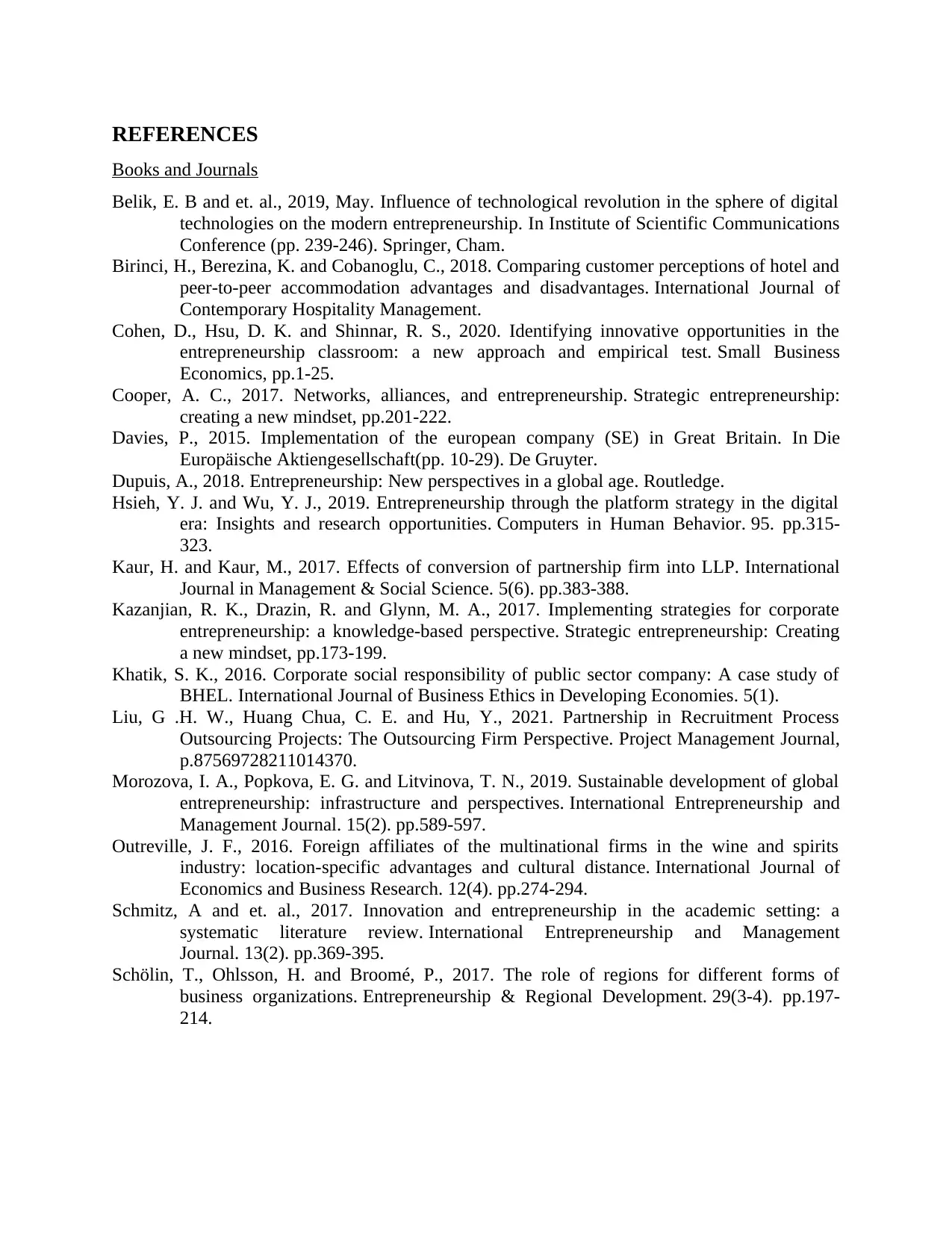
REFERENCES
Books and Journals
Belik, E. B and et. al., 2019, May. Influence of technological revolution in the sphere of digital
technologies on the modern entrepreneurship. In Institute of Scientific Communications
Conference (pp. 239-246). Springer, Cham.
Birinci, H., Berezina, K. and Cobanoglu, C., 2018. Comparing customer perceptions of hotel and
peer-to-peer accommodation advantages and disadvantages. International Journal of
Contemporary Hospitality Management.
Cohen, D., Hsu, D. K. and Shinnar, R. S., 2020. Identifying innovative opportunities in the
entrepreneurship classroom: a new approach and empirical test. Small Business
Economics, pp.1-25.
Cooper, A. C., 2017. Networks, alliances, and entrepreneurship. Strategic entrepreneurship:
creating a new mindset, pp.201-222.
Davies, P., 2015. Implementation of the european company (SE) in Great Britain. In Die
Europäische Aktiengesellschaft(pp. 10-29). De Gruyter.
Dupuis, A., 2018. Entrepreneurship: New perspectives in a global age. Routledge.
Hsieh, Y. J. and Wu, Y. J., 2019. Entrepreneurship through the platform strategy in the digital
era: Insights and research opportunities. Computers in Human Behavior. 95. pp.315-
323.
Kaur, H. and Kaur, M., 2017. Effects of conversion of partnership firm into LLP. International
Journal in Management & Social Science. 5(6). pp.383-388.
Kazanjian, R. K., Drazin, R. and Glynn, M. A., 2017. Implementing strategies for corporate
entrepreneurship: a knowledge‐based perspective. Strategic entrepreneurship: Creating
a new mindset, pp.173-199.
Khatik, S. K., 2016. Corporate social responsibility of public sector company: A case study of
BHEL. International Journal of Business Ethics in Developing Economies. 5(1).
Liu, G .H. W., Huang Chua, C. E. and Hu, Y., 2021. Partnership in Recruitment Process
Outsourcing Projects: The Outsourcing Firm Perspective. Project Management Journal,
p.87569728211014370.
Morozova, I. A., Popkova, E. G. and Litvinova, T. N., 2019. Sustainable development of global
entrepreneurship: infrastructure and perspectives. International Entrepreneurship and
Management Journal. 15(2). pp.589-597.
Outreville, J. F., 2016. Foreign affiliates of the multinational firms in the wine and spirits
industry: location-specific advantages and cultural distance. International Journal of
Economics and Business Research. 12(4). pp.274-294.
Schmitz, A and et. al., 2017. Innovation and entrepreneurship in the academic setting: a
systematic literature review. International Entrepreneurship and Management
Journal. 13(2). pp.369-395.
Schölin, T., Ohlsson, H. and Broomé, P., 2017. The role of regions for different forms of
business organizations. Entrepreneurship & Regional Development. 29(3-4). pp.197-
214.
Books and Journals
Belik, E. B and et. al., 2019, May. Influence of technological revolution in the sphere of digital
technologies on the modern entrepreneurship. In Institute of Scientific Communications
Conference (pp. 239-246). Springer, Cham.
Birinci, H., Berezina, K. and Cobanoglu, C., 2018. Comparing customer perceptions of hotel and
peer-to-peer accommodation advantages and disadvantages. International Journal of
Contemporary Hospitality Management.
Cohen, D., Hsu, D. K. and Shinnar, R. S., 2020. Identifying innovative opportunities in the
entrepreneurship classroom: a new approach and empirical test. Small Business
Economics, pp.1-25.
Cooper, A. C., 2017. Networks, alliances, and entrepreneurship. Strategic entrepreneurship:
creating a new mindset, pp.201-222.
Davies, P., 2015. Implementation of the european company (SE) in Great Britain. In Die
Europäische Aktiengesellschaft(pp. 10-29). De Gruyter.
Dupuis, A., 2018. Entrepreneurship: New perspectives in a global age. Routledge.
Hsieh, Y. J. and Wu, Y. J., 2019. Entrepreneurship through the platform strategy in the digital
era: Insights and research opportunities. Computers in Human Behavior. 95. pp.315-
323.
Kaur, H. and Kaur, M., 2017. Effects of conversion of partnership firm into LLP. International
Journal in Management & Social Science. 5(6). pp.383-388.
Kazanjian, R. K., Drazin, R. and Glynn, M. A., 2017. Implementing strategies for corporate
entrepreneurship: a knowledge‐based perspective. Strategic entrepreneurship: Creating
a new mindset, pp.173-199.
Khatik, S. K., 2016. Corporate social responsibility of public sector company: A case study of
BHEL. International Journal of Business Ethics in Developing Economies. 5(1).
Liu, G .H. W., Huang Chua, C. E. and Hu, Y., 2021. Partnership in Recruitment Process
Outsourcing Projects: The Outsourcing Firm Perspective. Project Management Journal,
p.87569728211014370.
Morozova, I. A., Popkova, E. G. and Litvinova, T. N., 2019. Sustainable development of global
entrepreneurship: infrastructure and perspectives. International Entrepreneurship and
Management Journal. 15(2). pp.589-597.
Outreville, J. F., 2016. Foreign affiliates of the multinational firms in the wine and spirits
industry: location-specific advantages and cultural distance. International Journal of
Economics and Business Research. 12(4). pp.274-294.
Schmitz, A and et. al., 2017. Innovation and entrepreneurship in the academic setting: a
systematic literature review. International Entrepreneurship and Management
Journal. 13(2). pp.369-395.
Schölin, T., Ohlsson, H. and Broomé, P., 2017. The role of regions for different forms of
business organizations. Entrepreneurship & Regional Development. 29(3-4). pp.197-
214.
1 out of 10
Related Documents
Your All-in-One AI-Powered Toolkit for Academic Success.
+13062052269
info@desklib.com
Available 24*7 on WhatsApp / Email
![[object Object]](/_next/static/media/star-bottom.7253800d.svg)
Unlock your academic potential
Copyright © 2020–2026 A2Z Services. All Rights Reserved. Developed and managed by ZUCOL.

